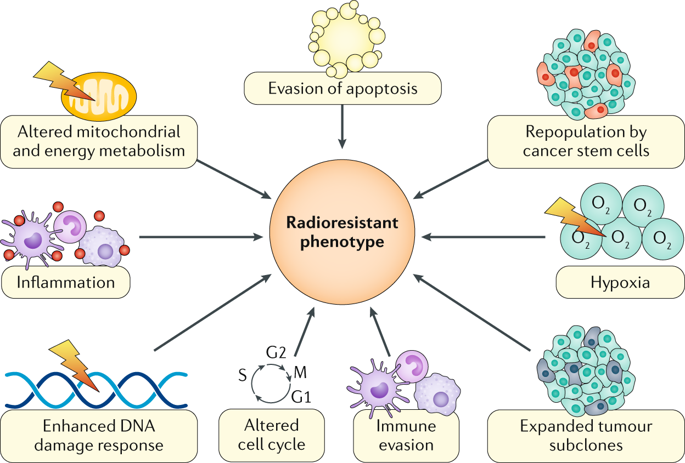当前位置:
X-MOL 学术
›
Nat. Rev. Gastroenterol. Hepatol.
›
论文详情
Our official English website, www.x-mol.net, welcomes your
feedback! (Note: you will need to create a separate account there.)
Targeting hallmarks of cancer to enhance radiosensitivity in gastrointestinal cancers.
Nature Reviews Gastroenterology & Hepatology ( IF 45.9 ) Pub Date : 2020-01-31 , DOI: 10.1038/s41575-019-0247-2 Amy M Buckley 1 , Niamh Lynam-Lennon 1 , Hazel O'Neill 1 , Jacintha O'Sullivan 1
Nature Reviews Gastroenterology & Hepatology ( IF 45.9 ) Pub Date : 2020-01-31 , DOI: 10.1038/s41575-019-0247-2 Amy M Buckley 1 , Niamh Lynam-Lennon 1 , Hazel O'Neill 1 , Jacintha O'Sullivan 1
Affiliation

|
Radiotherapy is used in the treatment of approximately 50% of all malignancies including gastrointestinal cancers. Radiation can be given prior to surgery (neoadjuvant radiotherapy) to shrink the tumour or after surgery to kill any remaining cancer cells. Radiotherapy aims to maximize damage to cancer cells, while minimizing damage to healthy cells. However, only 10-30% of patients with rectal cancer or oesophageal cancer have a pathological complete response to neoadjuvant chemoradiation therapy, with the rest suffering the negative consequences of toxicities and delays to surgery with no clinical benefit. Furthermore, in pancreatic cancer, neoadjuvant chemoradiation therapy results in a pathological complete response in only 4% of patients and a partial pathological response in only 31%. Resistance to radiation therapy is polymodal and associated with a number of biological alterations both within the tumour itself and in the surrounding microenvironment including the following: altered cell cycle; repopulation by cancer stem cells; hypoxia; altered management of oxidative stress; evasion of apoptosis; altered DNA damage response and enhanced DNA repair; inflammation; and altered mitochondrial function and cellular energetics. Radiosensitizers are needed to improve treatment response to radiation, which will directly influence patient outcomes in gastrointestinal cancers. This article reviews the literature to identify strategies - including DNA-targeting agents, antimetabolic agents, antiangiogenics and novel immunotherapies - being used to enhance radiosensitivity in gastrointestinal cancers according to the hallmarks of cancer. Evidence from radiosensitizers from in vitro and in vivo models is documented and the action of radiosensitizers through clinical trial data is assessed.
中文翻译:

靶向癌症的标志可增强胃肠道癌症的放射敏感性。
放射疗法用于治疗包括胃肠道癌在内的所有恶性肿瘤的约50%。可以在手术前进行放射治疗(新辅助放疗)以缩小肿瘤,或在手术后进行放射治疗以杀死任何剩余的癌细胞。放射疗法的目的是使对癌细胞的损害最大化,同时使对健康细胞的损害最小化。但是,只有10%至30%的直肠癌或食道癌患者对新辅助化学放疗有病理上的完全反应,其余患者则具有毒性的不良后果,并且延误了手术,没有临床益处。此外,在胰腺癌中,新辅助化学放疗仅在4%的患者中产生病理完全缓解,在仅31%的患者中导致部分病理缓解。对放射疗法的抵抗力是多峰的,并与肿瘤本身和周围微环境内的许多生物学变化有关,包括:细胞周期改变;癌症干细胞的繁殖;缺氧 改变氧化应激的管理;规避凋亡;改变了DNA损伤反应并增强了DNA修复;炎; 并改变了线粒体功能和细胞能量。需要放射增敏剂来改善对放射线的治疗反应,这将直接影响胃肠道癌症患者的预后。本文回顾了有关文献,以根据癌症的特征,确定用于增强胃肠道癌放射敏感性的策略-包括DNA靶向剂,抗代谢药,抗血管生成药和新型免疫疗法。
更新日期:2020-01-31
中文翻译:

靶向癌症的标志可增强胃肠道癌症的放射敏感性。
放射疗法用于治疗包括胃肠道癌在内的所有恶性肿瘤的约50%。可以在手术前进行放射治疗(新辅助放疗)以缩小肿瘤,或在手术后进行放射治疗以杀死任何剩余的癌细胞。放射疗法的目的是使对癌细胞的损害最大化,同时使对健康细胞的损害最小化。但是,只有10%至30%的直肠癌或食道癌患者对新辅助化学放疗有病理上的完全反应,其余患者则具有毒性的不良后果,并且延误了手术,没有临床益处。此外,在胰腺癌中,新辅助化学放疗仅在4%的患者中产生病理完全缓解,在仅31%的患者中导致部分病理缓解。对放射疗法的抵抗力是多峰的,并与肿瘤本身和周围微环境内的许多生物学变化有关,包括:细胞周期改变;癌症干细胞的繁殖;缺氧 改变氧化应激的管理;规避凋亡;改变了DNA损伤反应并增强了DNA修复;炎; 并改变了线粒体功能和细胞能量。需要放射增敏剂来改善对放射线的治疗反应,这将直接影响胃肠道癌症患者的预后。本文回顾了有关文献,以根据癌症的特征,确定用于增强胃肠道癌放射敏感性的策略-包括DNA靶向剂,抗代谢药,抗血管生成药和新型免疫疗法。











































 京公网安备 11010802027423号
京公网安备 11010802027423号